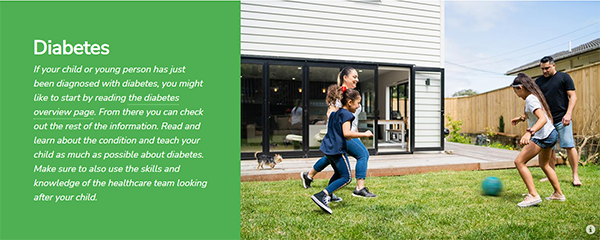Possible Complications In Children With Diabetes
Possible Complications In Children With Diabetes
You can reduce the risk of diabetes complications by maximising the time your glucose levels are in the target range (4 to 8 mmol/L). Screening is important to find any possible developing complications early.
Key points about diabetes complications
- you can reduce the risk of diabetes complications by maximising the time your glucose levels are in the target range (4 to 8 mmol/L)
- screening is important to find any possible developing complications early
- smoking increases the risk of complications
What diabetes complications are possible?
Eye problems
Retinopathy happens when there is damage to the retina. The retina is the thin layer of tissue at the back of the eye. It contains small blood vessels and nerve endings for vision. Other diabetes related eye conditions which can happen are cataracts and blurred vision. Regular screening will help to minimise any damage.
Current recommendations for screening for retinopathy
Type 1 diabetes
- start screening from the age of 11 years (after a child has had diabetes for 2 to 5 years)
- ongoing screening every 1 to 2 years depending on screening results
Type 2 diabetes
- start screening at diagnosis
- ongoing screening every 1 to 2 years depending on screening results
Kidney problems
The kidneys act as a filter for our bodies, passing waste into the urine which the body removes. Nephropathy refers to kidney damage linked to diabetes. Those most at risk are people who have one of the following:
- blood glucose levels which stay high over a long period of time
- constantly changing blood glucose levels over a long period of time
Regular screening to look for protein in the urine (microalbuminuria) will help to identify any early changes in kidney function, and minimise any damage that this condition may cause. The screening test for nephropathy is a urine sample. Your child will also need regular blood pressure checks.
Current recommendations for screening for nephropathy
Type 1 diabetes
- start screening from the age of 11 years (after a child has had diabetes for 2 to 5 years)
- ongoing screening every year
Type 2 diabetes
- start screening at diagnosis
- ongoing screening every year
Nerve problems
Neuropathy refers to nerve damage associated with diabetes. Again, those most at risk are people who have blood glucose levels that stay high over a long period of time.
Foot problems
Foot problems, due to decreased blood flow or nerve problems, are unlikely to happen in children or young people. However, feet need to be well cared for to prevent problems in later life. Podiatrists (people who treat foot disorders) can help.
Vascular (blood vessel) disease
This increases the risk of heart attacks and strokes. People with diabetes have an increased risk of getting vascular disease at an early age.
High blood pressure (hypertension)
This increases the risk of heart attacks and strokes. People with diabetes need blood pressure checks at the time of diagnosis and at least once a year.
Cholesterol or lipids
Cholesterol is a fat substance that is naturally present in blood and cells. High cholesterol increases the risk of heart attacks and strokes.
Current recommendations for lipid screening
Type 1 diabetes
- start screening soon after diagnosis (when diabetes has stabilised) in all children with type 1 diabetes from the age of 11 years
- ongoing screening depends on the results - if the first screen is normal, children need a repeat lipid profile every 3 years
- if there is a family history of high cholesterol or early cardiovascular disease, screening should start as early as the age of 2 years
Type 2 diabetes
- start screening at diagnosis
- ongoing screening every year
Auto-immune conditions (thyroid disease and coeliac disease)
People with type 1 diabetes have a higher risk of developing other auto-immune conditions. Children need screening blood tests at diagnosis and then every 2 to 5 years.
Oral health
Children and young people with diabetes are at increased risk of gum disease, tooth decay and infections. Glucose levels which stay high make this more likely. It is important for children and young people to:
- brush teeth with a fluoride toothpaste twice a day
- see a dentist regularly
Find out more about dental care for children and young people in New Zealand.
See more KidsHealth content on diabetes
This page last reviewed 04 September 2023.
Do you have any feedback for KidsHealth?
If you have any feedback about the KidsHealth website, or have a suggestion for new content, please get in touch with us.
Email us now
